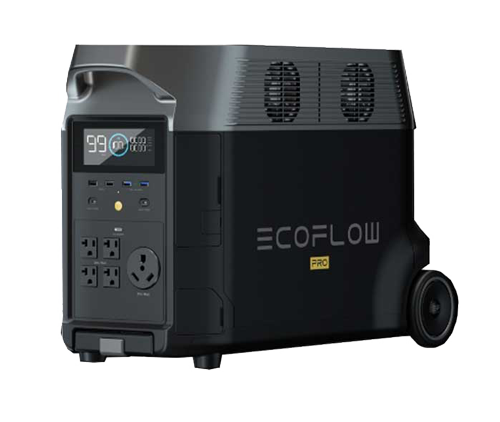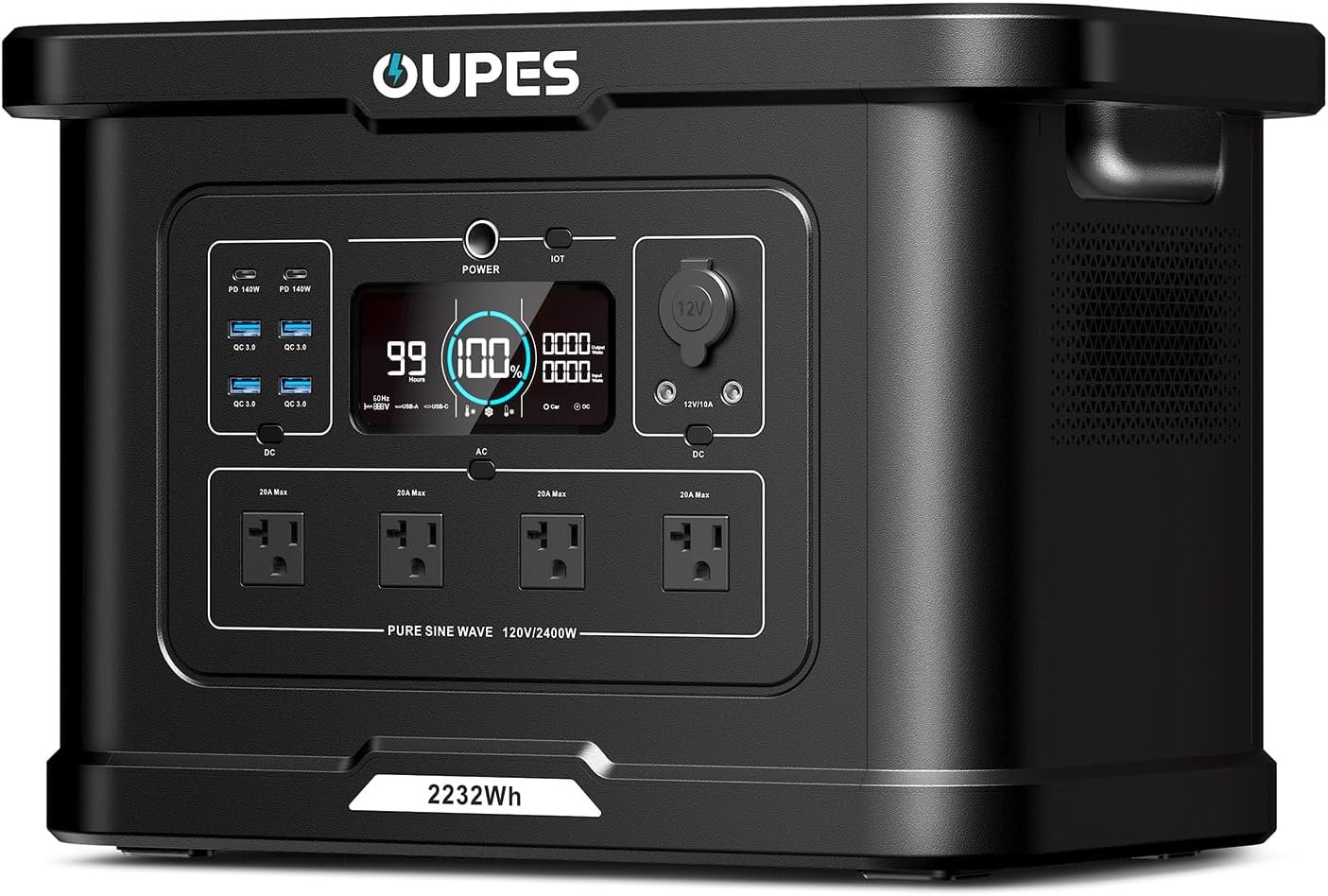|
10 People Are Viewing This Product Right Now |
Portable Gas Generator vs Diesel: Which Power Source is Right for You?
Portable Gas Generator vs. Diesel – When it comes to powering your home, RV, or outdoor adventures, the choice between a portable gas generator and a diesel generator can feel overwhelming. With each option boasting its own unique advantages and drawbacks, understanding the key differences is essential for making an informed decision that best suits your needs.
Gas generators are often celebrated for their ease of use, portability, and quieter operation, making them ideal for casual outings and emergency backups at home. On the other hand, diesel generators are renowned for their durability, fuel efficiency, and long-term reliability, making them a favored choice for heavy-duty applications and industrial uses.
In this comprehensive guide, we’ll delve into the specifics of both power sources, comparing their performance, maintenance requirements, and overall cost-effectiveness. Whether you’re looking to power a weekend getaway or ensure your home stays operational during outages, by the end of this post, you’ll be equipped with the knowledge to choose the right generator for your lifestyle and energy needs.
1. Introduction to Portable Generators
 Portable generators have become an essential tool for both homeowners and outdoor enthusiasts, providing a reliable source of power when and where it’s needed most. These versatile machines are designed to be easily transported, making them ideal for a variety of applications, from powering tools on a construction site to supplying electricity during a camping trip or emergency situation.
Portable generators have become an essential tool for both homeowners and outdoor enthusiasts, providing a reliable source of power when and where it’s needed most. These versatile machines are designed to be easily transported, making them ideal for a variety of applications, from powering tools on a construction site to supplying electricity during a camping trip or emergency situation.
At their core, portable generators convert mechanical energy into electrical energy, allowing you to operate appliances, lights, and other devices without being tethered to the electrical grid. Available in two primary fuel types—gasoline and diesel—these generators offer different benefits and drawbacks that cater to diverse needs and preferences.
Gasoline-powered generators are often favored for their convenience and ease of use. They typically start quickly, are lightweight, and are widely available, making them a popular choice for casual users. Conversely, diesel generators are known for their durability and fuel efficiency, often preferred for heavy-duty applications or extended use.
As you consider your options, it’s crucial to evaluate not only the power output and runtime of each type but also your specific needs, budget, and intended applications. Understanding the key differences between gasoline and diesel generators will help you make an informed decision that best suits your lifestyle and power requirements. In this blog post, we’ll delve deeper into the advantages and disadvantages of both fuel sources, aiding you in finding the perfect portable generator for your situation.
2. Overview of Gas Generators
When it comes to portable power solutions, gas generators stand out as versatile and user-friendly options that cater to a wide range of needs. These machines operate on gasoline, making them readily accessible and easy to refuel, which is a significant advantage for users who may require power on the go or in remote locations. Gas generators come in various sizes and power outputs, allowing consumers to choose a model that perfectly aligns with their specific requirements—whether it’s for camping trips, tailgating events, or providing backup power during outages.
One of the key features of gas generators is their lightweight design. Many models are compact and easy to transport, making them ideal for outdoor enthusiasts who need reliable electricity without the bulk and weight of larger units. Additionally, gas generators typically start quickly and require minimal setup, allowing users to get power where they need it without a hassle.
However, while gas generators offer convenience and portability, they also come with some considerations. For instance, gasoline can be less efficient than diesel, and frequent refueling may be necessary, especially during extended use. Moreover, gas generators can produce more noise and emissions compared to their diesel counterparts, which may be a concern in quieter environments or areas with strict noise regulations.
In summary, gas generators are a popular choice for users seeking a balance of convenience and portability. Their ease of use, quick startup capabilities, and availability make them a go-to option for various applications, but it’s essential to weigh these benefits against their limitations to determine if they’re the right fit for your power needs.
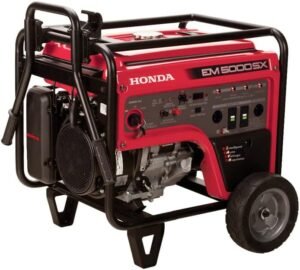
Honda 664350 EM5000SX 120V/240V
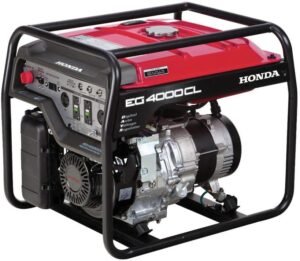
Honda 664342 EG4000 120V/240V
3. Overview of Diesel Generators
 When it comes to portable power solutions, diesel generators stand out as robust workhorses that deliver exceptional performance and reliability. These machines are engineered to handle significant loads, making them ideal for heavy-duty applications in both commercial and industrial settings. Diesel generators operate using compressed diesel fuel, which ignites within the engine’s cylinders to create the energy needed for electricity generation. One of the key advantages of diesel generators is their fuel efficiency. They typically consume less fuel than their gasoline counterparts while providing a higher power output, making them a cost-effective choice for long-term use.
When it comes to portable power solutions, diesel generators stand out as robust workhorses that deliver exceptional performance and reliability. These machines are engineered to handle significant loads, making them ideal for heavy-duty applications in both commercial and industrial settings. Diesel generators operate using compressed diesel fuel, which ignites within the engine’s cylinders to create the energy needed for electricity generation. One of the key advantages of diesel generators is their fuel efficiency. They typically consume less fuel than their gasoline counterparts while providing a higher power output, making them a cost-effective choice for long-term use.
Diesel engines are renowned for their durability and longevity. Built with sturdier components to withstand the rigors of constant use, these generators can often run for thousands of hours before requiring major maintenance. This reliability is crucial in situations where downtime isn’t an option, such as construction sites, emergency backup systems, and outdoor events. Additionally, diesel fuel has a longer shelf life compared to gasoline, meaning you can store it securely without worrying about it degrading quickly.
Another important consideration is performance in adverse conditions. Diesel generators perform well in extreme weather, offering consistent power even in challenging environments. Their ability to run continuously for extended periods without overheating or breaking down makes them a favored choice for remote locations or during emergencies when power is critical.
However, it’s essential to consider the trade-offs. Diesel generators tend to be heavier and bulkier, which may pose mobility challenges compared to lighter portable gas generators. They also typically come with a higher upfront cost, though this is often offset by their fuel efficiency and longevity over time.
In summary, diesel generators are powerful, durable, and efficient, making them a great option for those needing a reliable power source for demanding applications. Whether you’re powering a construction site, providing backup for critical systems, or embarking on a lengthy outdoor project, understanding the strengths and considerations of diesel generators can help you make an informed decision tailored to your specific needs.

Cummins Onan P4500I Portable Inverter Generator

Generac 6864 XD5000E 5000 Watt
4. Fuel Efficiency Comparison
When it comes to choosing between a portable gas generator and a diesel generator, fuel efficiency is a crucial factor that can impact both your operating costs and the convenience of use. Understanding how each fuel type performs in terms of efficiency can help you make an informed decision based on your specific needs.
- Gas Generators: Generally speaking, portable gas generators tend to be less fuel-efficient than their diesel counterparts. Most gas generators operate on gasoline, which is a lighter fuel. While gas generators may start up quickly and are often quieter during operation, they can consume fuel at a higher rate, especially under heavy loads. This means that for extended use, you might find yourself refueling more frequently, leading to increased costs over time. However, the initial purchase price of gas generators is often lower, which can appeal to those with a limited budget.
- Diesel Generators: On the other hand, diesel generators are renowned for their superior fuel efficiency. Diesel fuel has a higher energy density, allowing these generators to run longer on less fuel compared to gas generators. This can translate to significant savings, particularly for prolonged usage or in commercial applications where power demands are high. Additionally, diesel engines are typically designed to handle heavier loads without compromising performance, making them a reliable choice for those requiring consistent power output. While the initial investment for a diesel generator may be higher, the long-term savings on fuel can make it a more economical choice for many users.
In summary, if you prioritize long-term fuel savings and efficiency for continuous or heavy-duty applications, a diesel generator may be the best fit for you. However, for lighter, occasional use where noise levels are a concern and the budget is tighter, a portable gas generator could be the more appropriate solution. Understanding your power requirements and how often you plan to use the generator will ultimately guide you toward the right choice.
5. Power Output: Gas vs. Diesel
When it comes to choosing between a portable gas generator and a diesel generator, one of the most critical factors to consider is power output. The power output not only dictates the capabilities of your generator but also plays a vital role in determining which option aligns best with your specific needs.
- Gas generators are typically lighter and more compact, making them easier to transport and maneuver. They tend to offer a lower power output than diesel generators, generally ranging from 1,000 to 5,000 watts. This range is often sufficient for small-scale applications like camping trips, tailgating, or powering essential household appliances during short outages. However, if your power demands are higher—perhaps for running multiple tools on a job site or supporting larger appliances in an emergency—gas generators may fall short.
- On the other hand, diesel generators are renowned for their higher power output and efficiency. Ranging from 3,000 watts to over 30,000 watts, they are capable of handling substantial loads with ease. This makes them particularly well-suited for construction sites, large outdoor events, or as backup power for businesses that require uninterrupted operation. Diesel engines are designed to run longer and more consistently under heavy loads, making them a reliable choice for users who plan to utilize their generators for extended periods.
Moreover, diesel fuel tends to have a higher energy density than gasoline, allowing diesel generators to produce more power with less fuel consumption. This efficiency can translate into lower operational costs over time, particularly for users who need to run their generators for extended hours.
In summary, your choice between a gas generator and a diesel generator should hinge on your power requirements. If you need something lightweight and portable for smaller tasks, a gas generator may be the way to go. However, if you’re looking for robust power to tackle larger projects or endure longer outages, a diesel generator will likely serve you better. Evaluate your power needs carefully to ensure you select the right generator to keep your operations running smoothly.

Honda 664350 EM5000SX 120V/240V

Honda 664342 EG4000 120V/240V
6. Cost Analysis: Initial and Operational Expenses
When considering a power source for your needs, a thorough cost analysis of both portable gas generators and diesel generators is essential. This evaluation should encompass both initial purchase costs and ongoing operational expenses, which can significantly influence your decision.
1. Initial Costs
Portable gas generators typically have a lower upfront price compared to diesel generators. The simplicity of gas engines and their broad availability means that you can easily find a variety of models that suit different budgets without breaking the bank. On the other hand, diesel generators tend to be more expensive, reflecting their robust construction and ability to handle heavier workloads. If you’re primarily seeking an economical option for occasional use, a gas generator may be the way to go.
2. Operational Expenses
When it comes to fuel costs, diesel has the advantage of being more fuel-efficient, providing more power per gallon than gasoline. This efficiency can lead to lower long-term fuel expenses, especially for heavy-duty applications or when the generator is run for extended periods. However, it’s important to consider the volatility of fuel prices—gasoline prices can fluctuate widely, while diesel often remains more stable.
Additionally, maintenance costs can vary. Diesel engines tend to require less frequent maintenance due to their design, which can save you money over time. However, when maintenance is necessary, it can be more expensive than servicing a gas generator.
In summary, your choice between a portable gas generator and a diesel generator will ultimately depend on your specific power needs and budget. Carefully weighing the initial purchase price against fuel efficiency and maintenance expenses will help you make a more informed decision that aligns with your financial and operational goals.
7. Maintenance Requirements for Each Type
 When it comes to choosing between a portable gas generator and a diesel generator, understanding the maintenance requirements for each type is crucial for making an informed decision. While both options provide reliable power, they come with different upkeep needs that can impact your long-term satisfaction and operational costs.
When it comes to choosing between a portable gas generator and a diesel generator, understanding the maintenance requirements for each type is crucial for making an informed decision. While both options provide reliable power, they come with different upkeep needs that can impact your long-term satisfaction and operational costs.
Portable Gas Generators are often praised for their ease of use and lower initial costs. However, they do require regular maintenance to ensure optimal performance. Gas generators generally need their oil changed every 50 to 100 hours of operation, depending on the manufacturer’s recommendations.
Additionally, you should regularly inspect and replace the air filter, spark plugs, and fuel filter to prevent engine problems. Because gas is more volatile than diesel, fuel stability is also a concern; it’s advisable to use fuel stabilizers if the generator won’t be used for an extended period. Overall, the maintenance tasks for gas generators tend to be simpler and less time-consuming, making them a convenient option for occasional users.
On the other hand, Diesel Generators are renowned for their durability and fuel efficiency, but they come with more complex maintenance demands. Diesel engines typically require oil changes every 250 to 500 hours of operation, which is a longer interval than gas generators. However, they often require more frequent checks for air filters and fuel injectors, as well as regular coolant level monitoring to ensure optimal performance.
Diesel fuel can also degrade over time, so you’ll want to implement a fuel management plan to prevent issues like microbial growth and sediment build-up. While diesel generators may have higher upfront costs and more intensive maintenance schedules, their longevity and reliability can make them a worthwhile investment for those who require consistent power over extended periods.
Ultimately, your choice between a portable gas generator and a diesel generator should take into account not just your immediate power needs but also your willingness and ability to commit to ongoing maintenance. By understanding the specific requirements of each type, you can ensure that your chosen power source remains a dependable ally in your daily operations.
8. Noise Levels: Which Generator is Quieter?
When it comes to choosing between a portable gas generator and a diesel generator, one of the key considerations that often gets overlooked is noise levels. Whether you’re using a generator for camping, construction, or as a backup power source at home, the noise it produces can significantly impact your experience and the environment around you.
Gas generators tend to be quieter than their diesel counterparts. Typically, a portable gas generator operates at sound levels ranging from 50 to 70 decibels, comparable to the hum of a normal conversation or the sound of a vacuum cleaner. This makes them suitable for use in residential areas, especially during nighttime hours or events where noise disruption is a concern. Many modern gas generators even come equipped with noise-reduction technology, further minimizing sound output and enhancing user comfort.
On the other hand, diesel generators are known for their robustness and efficiency but can be significantly louder, often producing noise levels between 70 and 90 decibels or more. This level of noise can be disruptive, especially in quiet neighborhoods or natural settings. The high-pitched roar of a diesel engine can easily drown out conversations and disturb wildlife, making them less ideal for camping or residential use.
If noise is a critical factor for your application, it’s worth considering your specific needs. For casual outings or events where ambiance is key, a quieter gas generator may be the better choice. Conversely, if you’re in an industrial setting where noise is less of a concern, you might prioritize the power and efficiency that diesel generators offer. Ultimately, understanding the noise levels and their potential impact will help you make an informed decision that aligns with your lifestyle and requirements.

Cummins Onan P4500I Portable Inverter Generator

Generac 6864 XD5000E 5000 Watt
9. Portability and Weight Considerations
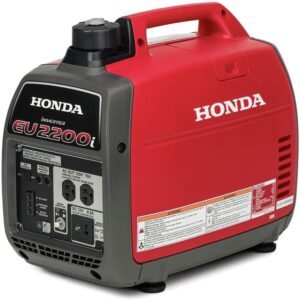 Portable Gas Generator vs Diesel – When it comes to choosing between a portable gas generator and a diesel generator, portability and weight are crucial factors that can significantly impact your decision. If your power needs require frequent relocation—such as camping trips, outdoor events, or job sites—a lightweight and compact solution is essential.
Portable Gas Generator vs Diesel – When it comes to choosing between a portable gas generator and a diesel generator, portability and weight are crucial factors that can significantly impact your decision. If your power needs require frequent relocation—such as camping trips, outdoor events, or job sites—a lightweight and compact solution is essential.
Gas generators typically excel in this regard. They are designed with mobility in mind, often featuring integrated wheels and lightweight frames, making them easy to transport. Most gas generators weigh considerably less than their diesel counterparts, allowing you to easily load them into a vehicle or maneuver them on-site without straining your back. For instance, a typical portable gas generator can weigh between 40 to 120 pounds, making it a practical choice for users who prioritize ease of transport.
On the other hand, diesel generators tend to be bulkier and heavier due to their robust construction and larger fuel tanks. While some models are designed for portability, they are often more suited for stationary use or scenarios where they won’t need to be moved frequently. Diesel generators can weigh upwards of 300 pounds, and while they are built to withstand heavy usage and provide long run times, their heft can be a disadvantage if you need to frequently change locations.
Consider your specific needs before making a decision. If you envision yourself needing to move your power source frequently, a gas generator might be your best bet. However, if you require a generator for long-term use in a single location, and your power demands are higher, the extra weight of a diesel generator may be justified for the benefits it provides in efficiency and longevity. Balancing portability with power requirements will help you find the right generator to suit your lifestyle and usage patterns.
10. Environmental Impact: Emissions and Sustainability
When choosing between a portable gas generator and a diesel generator, understanding the environmental impact of each option is crucial. Both power sources come with their own set of emissions, but they differ significantly in terms of sustainability and carbon footprint.
Gas generators typically produce fewer emissions compared to their diesel counterparts. They burn cleaner fuel, resulting in lower levels of harmful pollutants such as nitrogen oxides (NOx) and particulate matter. This makes gas generators a more environmentally friendly choice, especially for short-term use in residential or light commercial applications. However, it’s important to note that while gas generators may release less overall pollution, they still contribute to greenhouse gas emissions, particularly carbon dioxide (CO2).
On the other hand, diesel generators are known for their durability and efficiency, especially in larger models that provide substantial power output. However, they tend to emit higher levels of NOx and particulate matter, which can have significant adverse effects on air quality and public health. The combustion process in diesel engines produces more soot and can lead to more stringent regulations in urban areas or regions with strict environmental laws.
From a sustainability perspective, diesel fuel is derived from fossil fuels, which raises concerns about resource depletion and the long-term viability of using such energy sources. In contrast, gas generators can often run on natural gas, which is seen as a transitional fuel that can be sourced from more sustainable methods, including biogas from organic waste.
As the world increasingly shifts towards greener energy solutions, considering alternatives like solar-powered generators or hybrid systems that combine gas and renewable energy sources may be wise. These options can significantly reduce your environmental impact while still providing the reliable power you need.
Ultimately, your choice between a gas or diesel generator should carefully weigh the immediate power needs against the long-term environmental consequences. By being mindful of emissions and sustainability, you can choose a power source that not only meets your energy requirements but also aligns with a more eco-friendly future.
11. Best Use Cases for Gas Generators
Portable Gas Generator vs Diesel – When considering a portable gas generator, it’s essential to understand the scenarios where they truly shine. Gas generators are renowned for their versatility and convenience, making them an excellent choice for a variety of applications. Here are some of the best use cases for gas generators that highlight their strengths:
- Camping and Recreational Use: For outdoor enthusiasts, gas generators are a perfect companion. Whether you’re tailgating, camping in the woods, or enjoying a picnic at the beach, a portable gas generator can power your essential devices, from electric coolers to lights and cooking appliances. Its lightweight design and ease of transport make it an ideal choice for on-the-go adventures.
- Home Backup Power: During unexpected power outages, gas generators provide a reliable source of backup power for essential home appliances. They can keep your refrigerator running to prevent food spoilage, power lights, and even maintain heating or cooling systems. Their quick setup and ability to power multiple devices simultaneously make them a favored choice for homeowners looking to safeguard against disruptions in service.
- Construction Sites: In the construction industry, gas generators are invaluable. They can power tools, lights, and equipment in remote locations where electrical outlets are scarce or nonexistent. Their portability allows for easy relocation around the job site, ensuring that workers have the power they need precisely where and when they need it.
- Events and Festivals: For outdoor events, festivals, or parties, a gas generator is essential for providing electricity to sound systems, lighting, and food preparation areas. Event organizers often rely on the portability and reliable power supply of gas generators to keep the festivities running smoothly, regardless of the location.
- Emergency Preparedness: Gas generators are a crucial component of any emergency preparedness plan. In natural disaster-prone areas, having a portable gas generator on hand can ensure you have power for communication devices, medical equipment, and other necessities when the grid goes down. Their ease of use and relative affordability make them a practical addition to any emergency toolkit.
In summary, gas generators excel in various environments where portability, quick setup, and ease of use are paramount. Whether you’re an adventurer, a homeowner, or a construction worker, understanding these use cases will help you make an informed decision about when and how to utilize a portable gas generator to meet your power needs effectively.

Honda 664350 EM5000SX 120V/240V

Honda 664342 EG4000 120V/240V
12. Best Use Cases for Diesel Generators
When it comes to selecting a power source for your needs, diesel generators stand out for their robustness and reliability, especially in demanding environments. Here are some of the best use cases for diesel generators that highlight their strengths:
- Construction Sites: Diesel generators are the workhorses of the construction industry. Their durability and ability to produce high-power outputs make them ideal for powering heavy machinery, tools, and lighting on job sites. With their ability to run for long hours without needing frequent refueling, they can keep projects on schedule, even in remote locations where access to electrical grids is limited.
- Remote Locations: For operations in remote areas—whether for mining, oil exploration, or rural telecommunications—diesel generators provide a dependable solution. They can deliver consistent power where grid access is non-existent or unreliable, ensuring critical systems remain operational.
- Emergency Backup Power: In scenarios where electricity is crucial, such as hospitals, data centers, and municipal facilities, diesel generators serve as vital backup power sources. Their ability to start up quickly and sustain high load capacities makes them essential for maintaining operations during power outages, ensuring that life-saving equipment and data integrity are preserved.
- Agricultural Use: Farmers often rely on diesel generators to power irrigation systems, greenhouses, and other essential equipment. Their efficiency and longevity can significantly contribute to productivity in agricultural operations, especially during peak seasons when uninterrupted power is critical.
- Events and Festivals: For large outdoor events, concerts, and festivals, diesel generators provide a reliable power solution for lighting, sound systems, and other electrical needs. Their capacity to support high-powered equipment for extended periods makes them a preferred choice for event organizers looking to ensure a seamless experience for attendees.
- Industrial Applications: In manufacturing and industrial settings, diesel generators are often used as primary or backup power sources. Their efficiency in maintaining a continuous power supply helps streamline operations, making them ideal for factories and processing plants that require constant energy to keep machinery running smoothly.
- Military and Defense: Diesel generators are indispensable in military applications, where reliability and mobility are paramount. They can be deployed in various terrains and provide the necessary power for communication equipment, command centers, and operations in the field.
In summary, diesel generators excel in situations where power demands are high, reliability is non-negotiable, and access to conventional power sources is limited. By understanding these use cases, you can make an informed decision about whether a diesel generator is the right fit for your power needs.
13. Safety Considerations for Both Power Sources
Portable Gas Generator vs Diesel – When it comes to choosing between portable gas generators and diesel generators, safety should be at the forefront of your decision-making process. Each power source comes with its own set of safety considerations that need to be understood to ensure not only the longevity of your equipment but also the safety of you and those around you.
1. Gas Generators:
Portable gas generators are known for their ease of use and quick startup, but they also carry certain risks. One primary concern is carbon monoxide (CO) poisoning. Gas generators emit CO, a colorless, odorless gas that can accumulate quickly in enclosed spaces, leading to serious health risks. It is crucial to operate gas generators outdoors in well-ventilated areas, away from windows and doors, to minimize exposure. Additionally, check for leaks in the fuel lines or connections before each use, as even a small gas leak can lead to dangerous situations. Battery maintenance is also essential, as corroded terminals can lead to sparks and potential fire hazards.
2. Diesel Generators:
On the other hand, diesel generators are often praised for their durability and efficiency, yet they too come with safety concerns. Diesel fuel is less flammable than gasoline, which may seem like an advantage, but it is essential to handle it with care. Spills can create slippery surfaces and pose a risk of slipping or falling. Moreover, diesel generators can produce harmful emissions, including nitrogen oxides and particulate matter, which can be hazardous if inhaled. Therefore, operating a diesel generator in a well-ventilated area is just as critical as with gas generators. Regular maintenance checks on the exhaust system are also necessary to prevent harmful fumes from leaking into the environment.
In Summary
Both gas and diesel generators require a commitment to safety practices. Equip yourself with proper safety gear, such as gloves and goggles, and always read the manufacturer’s safety guidelines before use. Whether you choose gas or diesel, educating yourself on the specific risks and implementing safety measures can help ensure a safe and efficient power supply for your needs. By being proactive about safety, you can confidently harness the power of these generators while safeguarding your health and well-being.
14. User Experiences
 When it comes to choosing between a portable gas generator and a diesel generator, customer reviews and user experiences can provide invaluable insights that help guide your decision. In a world where online shopping has become the norm, the power of testimonials and firsthand accounts cannot be understated.
When it comes to choosing between a portable gas generator and a diesel generator, customer reviews and user experiences can provide invaluable insights that help guide your decision. In a world where online shopping has become the norm, the power of testimonials and firsthand accounts cannot be understated.
Users often share their experiences regarding efficiency, durability, and ease of use, painting a vivid picture of what to expect from each power source. For instance, many gas generator users rave about their lightweight design and ease of portability, making them ideal for camping trips or emergency power needs. Customers frequently highlight how quickly they can start the generator with a simple pull of the cord, and the inherent quietness of gas engines often earns them rave reviews for backyard barbecues or family gatherings.
On the flip side, diesel generator users often emphasize fuel efficiency and longevity. Reviews commonly mention how diesel generators have a reputation for running longer on a single tank of fuel, which can be a significant advantage during extended outages or job site use. Additionally, many users express satisfaction with the ruggedness of diesel units, noting their capacity to withstand heavy-duty work and adverse weather conditions.
However, it’s essential to note the context of each review. While one user may love their gas generator for its lightweight and silent operation, another might find it insufficient for their heavy-duty needs. Conversely, while diesel generators are praised for their robustness, some users may find them heavier and less convenient to transport.
Diving into customer reviews also sheds light on common issues, maintenance concerns, and the quality of customer service provided by manufacturers. A generator that may seem perfect on paper might not deliver in real-world situations, and user experiences can reveal these nuances. By understanding both the pros and cons shared by others, you can make a more informed choice that aligns with your specific power needs and lifestyle.
In summary, before making your final decision, take the time to sift through customer reviews and user experiences. They not only highlight the strengths and weaknesses of both portable gas and diesel generators but also provide a broader understanding of how each power source fits into the lives of everyday users.
15. Conclusion: Making the Right Choice for Your Needs
 In conclusion, Portable Gas Generator vs Diesel – choosing between a portable gas generator and a diesel generator ultimately depends on your specific needs, preferences, and the environment in which you plan to use it. Both power sources have distinct advantages and disadvantages that cater to different user requirements.
In conclusion, Portable Gas Generator vs Diesel – choosing between a portable gas generator and a diesel generator ultimately depends on your specific needs, preferences, and the environment in which you plan to use it. Both power sources have distinct advantages and disadvantages that cater to different user requirements.
If you prioritize portability, ease of use, and a quieter operation, a gas generator may be the right fit for you. They are typically lighter, easier to transport, and simpler to maintain, making them ideal for casual users, campers, or those needing temporary power solutions for outdoor events or home emergencies. Additionally, the lower initial cost and the availability of gasoline can make gas generators more accessible for users who don’t require continuous heavy-duty power.
On the other hand, if you’re seeking reliability, efficiency, and long-term cost-effectiveness, a diesel generator could be your best option. Diesel generators excel in providing sustained power over extended periods, making them a popular choice for construction sites, large events, or as backup power for businesses. Though they may come with a higher upfront investment and require more extensive maintenance, their durability and fuel efficiency often pay off in the long run.
Portable Gas Generator vs Diesel – Ultimately, assessing your power needs, budget, and intended usage scenario will guide you in making an informed decision. Whichever generator you choose, understanding the strengths and limitations of both options will ensure your investment serves you well for years to come. By carefully weighing these factors, you can confidently select a generator that aligns with your lifestyle and energy demands, empowering you to tackle any situation with the right power source at your disposal.

Cummins Onan P4500I Portable Inverter Generator

Generac 6864 XD5000E 5000 Watt
You Might Also Like
- How Does A Heat Pump Work?
- Best Goodman Heat Pump For Residential Use
- The Ultimate Guide to Power Pro Generators
- Harnessing Energy: A Deep Dive into Power Pro Generators
- The Ultimate Guide to the Power Pro Generator





